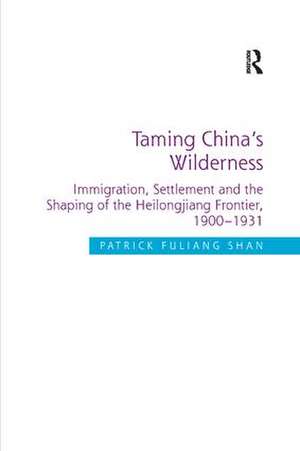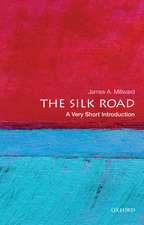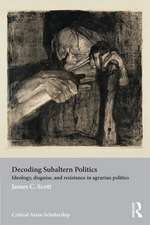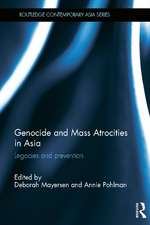Taming China's Wilderness: Immigration, Settlement and the Shaping of the Heilongjiang Frontier, 1900-1931
Autor Patrick Fuliang Shanen Limba Engleză Paperback – 3 mar 2017
| Toate formatele și edițiile | Preț | Express |
|---|---|---|
| Paperback (1) | 469.34 lei 6-8 săpt. | |
| Taylor & Francis – 3 mar 2017 | 469.34 lei 6-8 săpt. | |
| Hardback (1) | 1111.40 lei 6-8 săpt. | |
| Taylor & Francis – 28 apr 2014 | 1111.40 lei 6-8 săpt. |
Preț: 469.34 lei
Nou
Puncte Express: 704
Preț estimativ în valută:
89.82€ • 93.43$ • 74.15£
89.82€ • 93.43$ • 74.15£
Carte tipărită la comandă
Livrare economică 12-26 aprilie
Preluare comenzi: 021 569.72.76
Specificații
ISBN-13: 9781138707276
ISBN-10: 1138707279
Pagini: 240
Dimensiuni: 156 x 234 mm
Greutate: 0.45 kg
Ediția:1
Editura: Taylor & Francis
Colecția Routledge
Locul publicării:Oxford, United Kingdom
ISBN-10: 1138707279
Pagini: 240
Dimensiuni: 156 x 234 mm
Greutate: 0.45 kg
Ediția:1
Editura: Taylor & Francis
Colecția Routledge
Locul publicării:Oxford, United Kingdom
Notă biografică
Patrick Fuliang Shan, Ph.D, is an associate professor of history at Grand Valley State University where he teaches Chinese history, East Asian history and world history. He has served as the president of the Chinese Historians in the United States (2009-2011), a member of the board of the Historical Society for Twentieth Century China (2010-2014), and an associate editor of American Review of China Studies (since 2012). Currently, he is the coordinator of the East Asian Studies Program at Grand Valley State University.
Recenzii
'Patrick Fuliang Shan offers an outstanding study of Heilongjiang as a developing frontier during an important historical era. This unique monograph not only reveals the distinctive features of the northeasternmost frontier but also exposes the historical trajectory of modern China. The book is the crystallization of the author’s decade long diligence and must be viewed as a significant contribution to Chinese studies.' Xiaobing Li, University of Central Oklahoma, USA 'I was very impressed with the depth and breadth of primary sources. I know of no other book that examines this frontier region in this sort of detail. We can often gain insights into the formation of modern states by studying their margins. Taming China’s Wilderness gives a unique perspective on the fall of the Qing Dynasty and the formation of the Republic from the periphery. With an unparalleled command of the relevant archival sources, Patrick Fuliang Shan has shown how this remote, beautiful region has much to say about the process of making the modern Chinese state.' James Carter, Saint Joseph’s University, USA 'Patrick Fuliang Shan’s new book on the Heilongjiang frontier in the early twentieth century is a wonderful addition to the field of Chinese history and of borderland studies. Combining careful research with theoretical sophistication, it brings China’s periphery to the centre of the debate over nation-formation and state-building.' Rana Mitter, University of Oxford, UK ’The author’s thesis is clear, with his arguments fully supported with evidence. The book is a good read, suitable for scholars as well as students or anyone who is interested in learning about Chinese history. The author’s great effort at collecting necessary information is admirable. The exhaustive bibliography is a good proof, which can provide other researchers with good information for further studies. Patrick Fuliang Shan has made a great contribution to our studies in the field of Chinese regional
Cuprins
Introduction; Chapter 1 Immigrants, Settlers and New Communities; Chapter 2 Land, Tenancy and Economic Transformation; Chapter 3 Ethnic Transition to Agricultural Life; Chapter 4 Insecurity, Banditry and Social Order; Chapter 5 Russian Influence and Chinese Response;
Descriere
For most of its rule, the Qing dynasty (1644-1911) - whose historical homeland was in Heilongjiang - enforced a policy that prohibited Chinese immigration and settlement and maintained the region’s reputation as the Great Northern Wilderness. Covering the period between the reversal of the anti-immigration policy in 1900 and the Japanese annexation of Heilongjiang into their Manchuko state in 1931, this book investigates a territory undergoing rapid and sustained change, and adds to the on-going scholarly interest in border and frontier studies.















